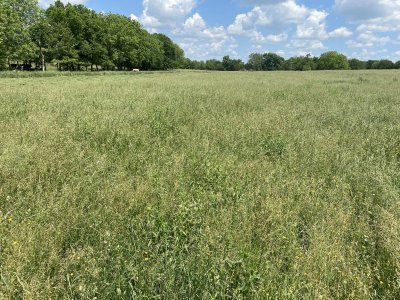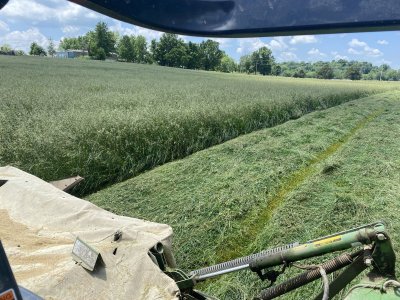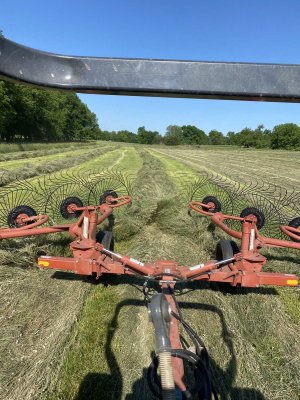You are using an out of date browser. It may not display this or other websites correctly.
You should upgrade or use an alternative browser.
You should upgrade or use an alternative browser.
First time haying
- Thread starter blackladies
- Start date

Help Support CattleToday:
coachg
Well-known member
Looks good ! So far . 
chevytaHOE5674
Well-known member
Looks like there's a bit of un-raked hay at the bottom of that windrow. If so be careful I'll bet it's awfully green.
A.J.
Well-known member
Nice looking fields. I hope the weather and equipment all cooperate for you.
blackladies
Well-known member
That or just bad cutting or raking by me since I don't have any idea what I'm doing. Might have a bunch of moldy round bales this winter.Looks like there's a bit of un-raked hay at the bottom of that windrow. If so be careful I'll bet it's awfully green.
chevytaHOE5674
Well-known member
If the bottom is still green then flip it over again and get it to dry. Putting up damp hay that is going to mold is a very costly endeavor.
chaded
Well-known member
Is it common in your area to use a tedder? I say that because some places don't but here you won't see anyone making hay without one.
Mrcopier
Well-known member
Never bale green hay. It should snap when you pick up a handful and bend it, at least that how we do it in E Texas
Never bale green hay. It should snap when you pick up a handful and bend it, at least that how we do it in E Texas
sounds overly dry. You should be able to bend the hay and it not go back. if it snaps that stuff is about dust.
farmerjan
Well-known member
Son cut our first time this year.... I will tedd it out this afternoon/eve... and again tomorrow and rake on Wed. We roll nearly all first cutting, and still want it good and dry to not lose it to mold... and to prevent any chance of it heating and catching fire...
blackladies
Well-known member
Just depends on the person, would use one if I had one but tight on money. Will probably by one eventually.Is it common in your area to use a tedder? I say that because some places don't but here you won't see anyone making hay without one.
farmerjan
Well-known member
You can go through and roll the hay over again with the rake you have... to flip the bottom side up to the sun/breeze to dry it more...
Travlr
Well-known member
I had a guy in Arkansas hire me to bring in his small squares and stack them in the barn. They were baled wet and I'd bet they weighed 100/120 a bale. Made the trailer squat for sure. We took one load in, only stacked three high, and told him to go back out and either cut the bales and scatter the hay to dry out or just call it a loss. To his credit he understood right away. I don't know what he ended up doing... but he never called to get the hay to the barn so I suspect he just let it go.Never bale green hay. It should snap when you pick up a handful and bend it, at least that how we do it in E Texas
Stickney94
Well-known member
Good luck! Two things I'd mention -- making hay is a very "local" process. Crop type, local weather, humidity, equipment are all variables that need to be factored in (or learned by hard experience) -- what works in TX probably isn't the best method in MN.
Second -- I'm still amazed what cattle will eat. I swear they prefer to eat hot carmelized bales more than anything. They will also pick through perfectly cured hay, make a mess, and then use it for bedding.
Second -- I'm still amazed what cattle will eat. I swear they prefer to eat hot carmelized bales more than anything. They will also pick through perfectly cured hay, make a mess, and then use it for bedding.
chaded
Well-known member
Good luck! Two things I'd mention -- making hay is a very "local" process. Crop type, local weather, humidity, equipment are all variables that need to be factored in (or learned by hard experience) -- what works in TX probably isn't the best method in MN.
Second -- I'm still amazed what cattle will eat. I swear they prefer to eat hot carmelized bales more than anything. They will also pick through perfectly cured hay, make a mess, and then use it for bedding.
A couple years ago I was experimenting with bale grazing. I flipped the bales ends up because I wanted to be able to cut and take the strings off when it came time. Those bales were out for a good while like that soaking up quite a bit of rain.
I didn't have to feed all of them so the last 7 or so got really bad. They were like black and I said I probably need to to get them out of that pasture but then I thought, no way they will eat them so i have time. That spring when I rotated them back in there they proceeded to go past a bunch of good grass and eat all of those bales down to the dirt very quickly without any issues. That's when I decided I worry too much. Lol.
puzzled in oregon
Well-known member
- Joined
- May 31, 2020
- Messages
- 896
- Reaction score
- 1,198
Tedders are really nice to have, especially along the coastal where I am. There are tedder/rake combos, that allow you to
change from the tedder to the rake just by adjusting the the angle of the tines.
change from the tedder to the rake just by adjusting the the angle of the tines.
Travlr
Well-known member
The right kind of mold in hay can cause miscarriages. But I've fed old, moldy hay too.A couple years ago I was experimenting with bale grazing. I flipped the bales ends up because I wanted to be able to cut and take the strings off when it came time. Those bales were out for a good while like that soaking up quite a bit of rain.
I didn't have to feed all of them so the last 7 or so got really bad. They were like black and I said I probably need to to get them out of that pasture but then I thought, no way they will eat them so i have time. That spring when I rotated them back in there they proceeded to go past a bunch of good grass and eat all of those bales down to the dirt very quickly without any issues. That's when I decided I worry too much. Lol.
farmerjan
Well-known member
@chaded ; You try to make the hay as good as possible, and then they will go and eat stuff that you think belongs dumped in a ditch as a water stopper.... yep, go figure...
We are having warm dry sun today and no humidity... Great for drying. Have seen several fields down... so more than just us, are trying to get going since it has been dry and the 1st cutting looks to be shorter and it is all heading out already. Mowing went well, I will tedd in the morning, and rake Wed morning... about 12 acres. We will put in corn in a couple weeks... we are the last one they plant and the last one they harvest at the end of the season. Works good for us.
We are having warm dry sun today and no humidity... Great for drying. Have seen several fields down... so more than just us, are trying to get going since it has been dry and the 1st cutting looks to be shorter and it is all heading out already. Mowing went well, I will tedd in the morning, and rake Wed morning... about 12 acres. We will put in corn in a couple weeks... we are the last one they plant and the last one they harvest at the end of the season. Works good for us.
A lot of balers have moisture meter's on them to tell you the moisture content of the hay. You can also check the moisture content of the hay before baling/rolling with a moisture meter.
I would add, if you have any suspicion that the moisture content is too high after it is baled, do not put those bales in a barn. Every year a lot of barns burn because of this.
I would add, if you have any suspicion that the moisture content is too high after it is baled, do not put those bales in a barn. Every year a lot of barns burn because of this.
Baled some hay last fall that the meter said to wet. It was right as the hay was not to good of shape when feeding. They were giving a good chance of rain the next day.A lot of balers have moisture meter's on them to tell you the moisture content of the hay. You can also check the moisture content of the hay before baling/rolling with a moisture meter.
I would add, if you have any suspicion that the moisture content is too high after it is baled, do not put those bales in a barn. Every year a lot of barns burn because of this.


